The Infernal Affairs trilogy (2002-03): Criterion Blu-ray review
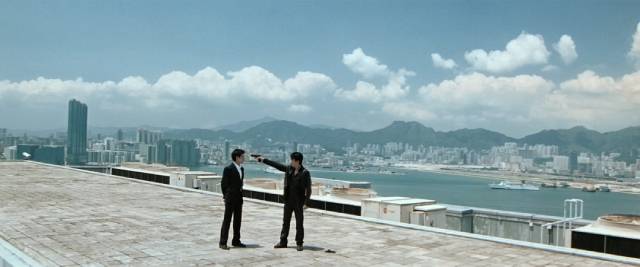
Hong Kong, despite being a relatively small place under British colonial rule, had a vibrant and prolific film industry whose influence was widely felt when martial arts action movies became popular around the world in the ’60s and ’70s. That success inspired filmmakers to explore other arenas for action and in the ’80s martial arts was somewhat pushed aside by contemporary thrillers, though in the hands of someone like John Woo the themes of traditional martial arts were transposed into stories of cops and criminals – honour and betrayal, the bonds of brotherhood which crossed social boundaries.
These crime-centred movies flourished from the mid-’80s into the ’90s, when a new wave of martial arts began to reassert the older genre in new forms. Major filmmakers moved fluidly between these modes – John Woo, Tsui Hark, Wong Kar-Wai all contributed both martial arts and contemporary thrillers which transcended and transformed the practice from which they emerged. This fertile cultural industry foundered towards the end of the ’90s as Hong Kong finally reverted to Chinese possession and political and economic uncertainty shook the confidence of producers.
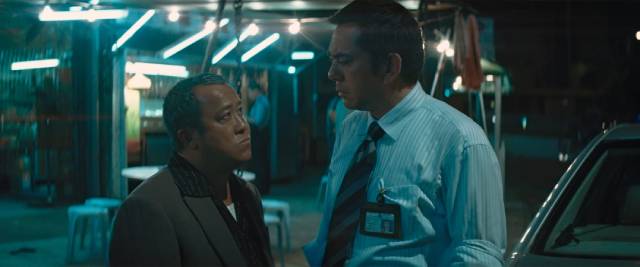
Both Andrew Lau Wai-keung and Alan Mak began their directing careers in the ’90s with contemporary stories mixing romance and crime. Five years after the hand-over, with the local industry in disarray, Lau and Mak teamed up with writer Felix Chong Man-keung in an attempt to revitalize Hong Kong cinema. Their vehicle was a thriller rooted in the action genre which had flourished in the ’80s, but which embodied all the uncertainty Hong Kong was experiencing as it struggled to redefine itself under Chinese rule. The movie Lau and Mak made, a complex meditation on identity and motives, turned out to be a huge critical and commercial success, spawning two sequels the following year.
Infernal Affairs (2002) – the title conflates the self-investigative department of the police force with Avici, the deepest level of Buddhist hell – takes themes familiar from movies like John Woo’s The Killer (1989) and Hard-Boiled (1992), the complicated relationship between cops and criminals, the effect of conflicted loyalties on identity, and enriches them with an intricate narrative revolving around a doubling of key characters. The figure of the undercover cop who begins to lose himself in his assumed identity is a common trope, but in Lau and Mak’s hands this character has a mirror image in a criminal placed inside the police force.
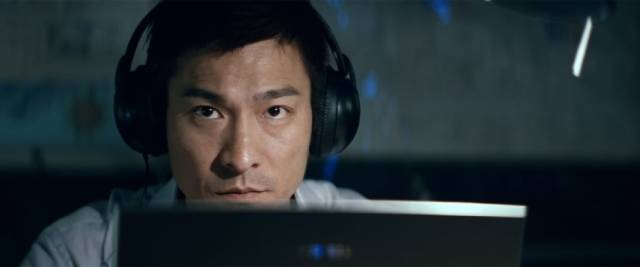
As both sides become aware that they have been infiltrated by a mole, the undercover agents are drawn into a tense competition as each tries to identify and expose the other before being exposed themselves. In a prologue set in 1991, triad boss Hon Sam (Eric Tsang) toasts a group of young recruits who are to be sent to the police academy with the aim of aiding his business by feeding him inside information. Around the same time that Lau Kin Ming (Edison Chen) joins the force, Chen Wing Yan (Shawn Yue) is washed out of the academy.
Jumping ahead a decade, we learn that Yan (now Tony Leung Chiu-Wai) has actually been undercover for ten years, his identity known only to his handler SP Wong Chi Shing (Anthony Wong); he has risen in the ranks of Sam’s gang, engaged in crimes and violence, while clinging to his sense of himself as a decent man. Not surprisingly, he wants out, but Wong keeps pushing him to continue his deception. Meanwhile, Lau (now Andy Lau) has risen in the force to a position of authority, feeding information to Sam but increasingly wanting to be genuinely on the right side. For each man, the role he has assumed for the past decade has exerted an influence on his sense of himself, their loyalties torn in conflicting directions.
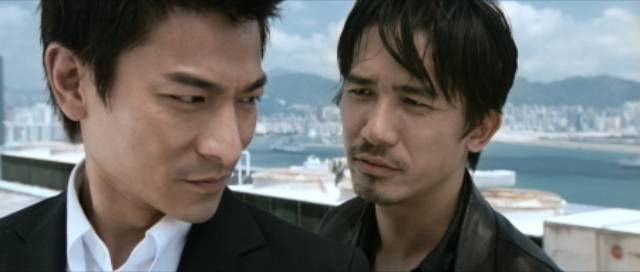
Their doubling is echoed in the long-standing relationship between Wong and Sam, who share that odd familiarity common to cops and criminals whose paths have become interwoven over the years – think De Niro and Pacino in Michael Mann’s Heat (1995). They share a world which separates them from the society in which they operate and brings them paradoxically closer to one another than to the civilians they respectively serve and prey on.
Lau and Mak create an intricate mosaic from these elements, which accumulate layers of uncertainty and insecurity in a fast-paced narrative marked by one bravura sequence after another. The most elaborate of these is a complex sequence in which Sam is making a drug deal which is being tracked by the police. Yan is feeding information to Wong via Morse code tapped on a window to which he’s attached a microphone, while Lau is monitoring communications for Wong’s unit and feeding information continuously back to Sam. The two moles become aware of each other’s presence and the deal is aborted. The complex interactions across multiple locations and among a large number of characters are rendered with impressive visual clarity while also initiating the film’s core drama with the increasingly dangerous cat-and-mouse conflict which threatens Yan and Lau with exposure.
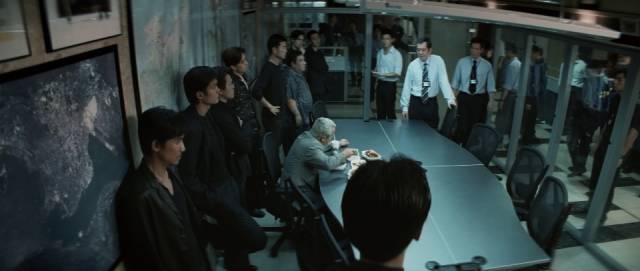
Once begun, the course of this contest may be inevitable, but it’s marked with unexpected and shocking turns which continually deepen the characters and add nuance to the themes. By the end, with three of the four main characters dead, uncertainty has risen to the level of tragedy and we’re unexpectedly left with Lau and a sense of his own desire to be genuinely what he has pretended to be, a decent man doing what’s right.
Given the first film’s ending, the prospect of a sequel posed obvious problems. So Lau, Mak and Chong went for a prequel instead, jumping back a decade to create something like an origin story. The danger here is that since the audience already knows where everyone ended up, there may be little suspense and less revelation in filling in events glimpsed or implied in the first film. But somehow they manage to avoid these pitfalls and what we get is a deepening of the narrative and a greater understanding of the characters.
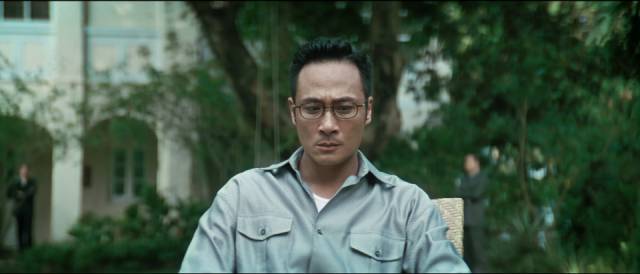
Infernal Affairs II (2003) opens with a long scene in which Wong talks to Sam while the latter listens and eats. In the first film, it was clear that these two had a long-standing relationship which coloured their “professional” antagonism, but here we sense something close to a friendship. Sam is not yet a triad boss, but rather an underling in the gang run by Ngai Wing Hau (Francis Ng). Wong, the upright cop of the first film, is here in the past not averse to using unsanctioned methods in his quest to bring down the gang; in fact his efforts actually assist in Sam’s rise to power.
If anything, identities and relationships are messier and more complicated here. We learn that Yan (Shawn Yue again) is actually related to Hau and this connection is in part what got him kicked out of the police academy – and also partly what inspired Wong to send him undercover in the gang, where Yan is determined to prove himself not to be like them. And Lau (Edison Chen again) proves himself a dedicated and exemplary officer, quickly rising in the ranks, initially to fulfill his assignment for Sam, but perhaps increasingly because the role supports his sense of himself as a decent man.
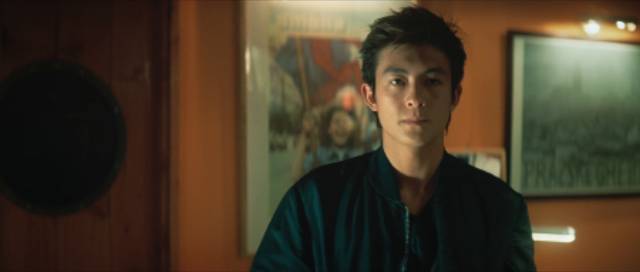
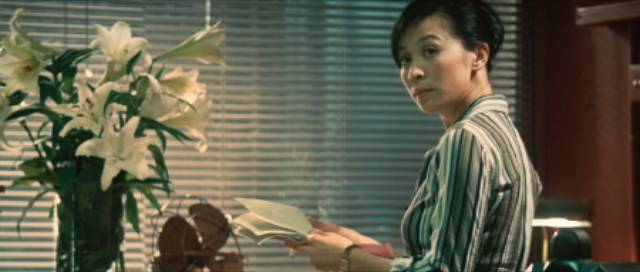
The doubling of characters continues with two women named Mary – a writer whom Lau marries (Sammi Cheng Sau-man) and Sam’s wife (Carina Lau Ka-ling); Yan falls for the latter, although she’s his boss’s wife, and her rejection of him leads to a shocking moment which undermines our sense of Yan as a fundamentally decent guy.
The second film is concentrated on revealing how all the characters arrived at the place they occupied in the first film; we see both Sam and Lau rising through their respective organizations, Wong moving from a compromised cop working outside the rules to one who grows in authority partly through his relationship with his key undercover man, while Yan himself moves from someone rebelling against his connection with the triad to someone seeking a positive sense of himself … and a way out of an intolerable situation.
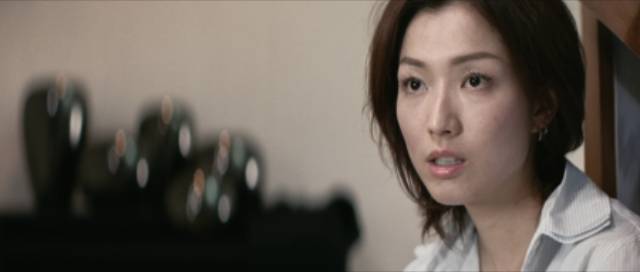
The third film, made quickly on the heels of number two, draws together the many threads of plot and character, seeking a resolution which remains tentative – just as the state of post-hand-over Hong Kong remained uncertain. Infernal Affairs III (2003) shifts back and forth in time, from a few months before to a few months after the events of the first film. We now know more about the characters, so our perspective on the original events and the characters involved is more complicated – paradoxically, the more we know, the less certain we can be about what we’re seeing. And since we know what is coming and how it came about, there’s a deep sense of melancholy – all these characters are trapped by their past, having been shaped in ways which are at odds with who they could have been given different circumstances. There’s a powerful sense of missed opportunities and wrong paths taken, and the difficulty of passing judgment because character and motive are so difficult to discern with any certainty.
Unlike most trilogies, which extend and elaborate a narrative in a more or less linear way, the three Infernal Affairs movies continually circle a particular series of events, drilling down rather than expanding the story. Perhaps the closest comparison would be Francis Ford Coppola’s Godfather movies, particularly the first two, in which the original film has a clearly focused narrative, which is then given a much more expansive context in the second film, critiquing and reinterpreting what we thought we had clearly understood in the original. As the work progresses, it gets messier and more complicated, questioning our perceptions and responses and leaving us with a lingering feeling of uncertainty.
*
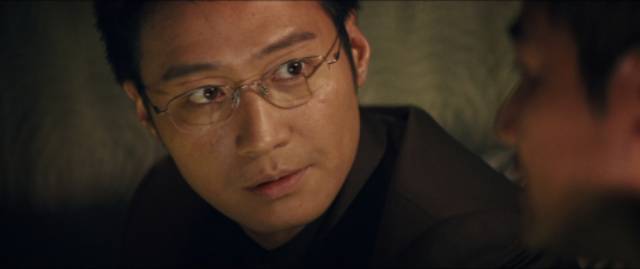
In addition to the three intricate, interlocking scripts, the trilogy offers something like a summary of Hong Kong action cinema with visual echoes of past movies (the characters posed with guns drawn and aimed at each other’s heads is an iconic image, particularly from the films of John Woo), while tempering the more operatic qualities of the genre with a contemporary realism which ironically contrasts the complicated relationships and moral confusion with a formal technique situating the characters in cool modernist settings. The films’ signature image is of two characters standing on a rooftop with the city and harbour stretched out behind them, small figures in an implacable urban landscape.
In addition to co-directing, Andrew Lau also served as cinematographer (in collaboration with Lai Yiu-Fat on the first film, and Ng Man-Ching on the two sequels), with veteran Christopher Doyle as a visual consultant on the first film. Sleeker and more polished than the classic action movies of the ’80s, the trilogy seems to be deliberately updating familiar tropes for the new century – with the transfer to Chinese rule reflected in an alternate ending for the first film in which the original open-ended conclusion (which paved the way for the sequels) abruptly closed off with a crime-doesn’t-pay moment for the Chinese domestic market. As conceived, and completed, for foreign markets the trilogy offers no comforting resolution, but instead remains uneasy about where Hong Kong stands in a radically changed political environment.

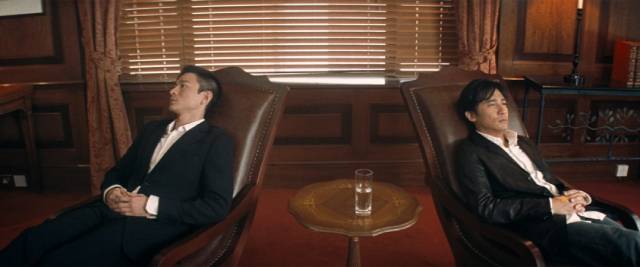
In addition to the visual echoes of the past, the cast represents a broad history of Hong Kong cinema. Along with mega-stars Tony Leung Chiu-Wai and Andy Lau – whose work spanned all genres and included movies for most major directors, from Wong Kar-Wai to Wong Jing, Sammo Hung and Corey Yuen, from John Woo to Ann Hui – the cast is packed with familiar character actors who encompass the full range from arthouse classics to the most extreme Category III exploitation – Anthony Wong, Eric Tsang, Francis Ng, Carina Lau, Leon Lai – while showcasing relative newcomers Edison Chen, Shawn Yue, Sammi Cheng, Kelly Chen.
While the Hong Kong film industry has seemingly flourished in the twenty-five years since the colony reverted to Chinese rule, with elaborate action films – both contemporary thrillers and period martial arts – continuing to find international success, few genre movies have attempted the complexity of the Infernal Affairs trilogy, which remains a significant assertion of Hong Kong’s distinct identity in the face of Chinese rule, while exploring thematically the nature of identity itself.
*
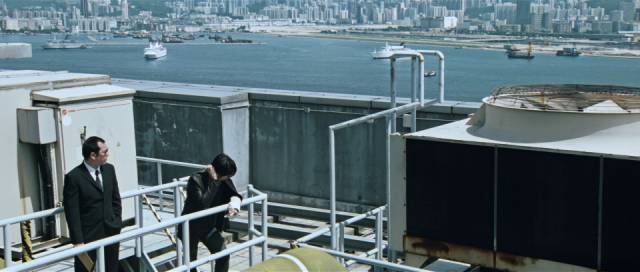
The disks
Although scanned in 4K from the original camera negatives, all three films have muted colour and a slightly soft image which appears to be inherent to the material, perhaps a deliberate choice to reflect the murky psychological and moral world the characters inhabit. The sound, however, is clear, sharp and dynamic.
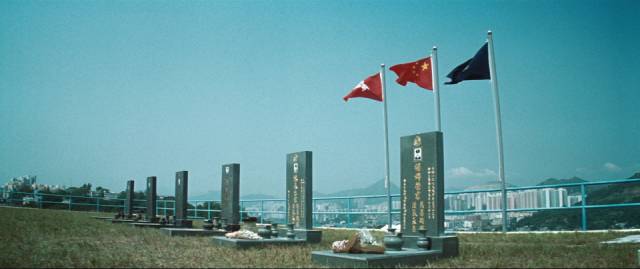
The supplements
The set includes two commentaries from Andrew Lau Wai-keung, Alan Mak and writer Felix Chong Man-keung – for some reason there’s no commentary on the third film – plus more than three hours of new and archival extras across the three disks. Most interesting is a newly recorded conversation between the directors (38:06) about their intentions and what it took to put the project(s) together in the new political and economic environment so soon after the hand-over. Each disk has a brief contemporary making-of which essentially has the cast and filmmakers talking about how great it was to work together on such an ambitious project. There are also some outtakes and deleted scenes, archival interviews and trailers, plus the alternate ending of the first film (we get the entire final reel [19:09], although it seems identical to the original version except for the final minute or so with its abrupt crime-doesn’t-pay coda).
The booklet essay is by critic Justin Chang.
Comments
Dear Cagey Films,
I wanted to take a moment to express my appreciation for your excellent review of “The Infernal Affairs Trilogy” Criterion Blu-ray. Your in-depth analysis and keen insights truly capture the essence of this groundbreaking film series. I especially enjoyed how you highlighted the exceptional performances, gripping storytelling, and expertly crafted visuals that make this trilogy a modern classic.
Your review not only showcases your deep knowledge and passion for cinema but also leaves readers craving to experience these films for themselves. I truly admire your ability to captivate and engage your audience through your articulate and informative writing style. It’s evident that you have a talent for bringing films to life with your words.
Thank you for sharing your expertise and passion with us. Your review has not only enriched my understanding of “The Infernal Affairs Trilogy” but also heightened my anticipation to explore more of your insightful commentaries and recommendations. Keep up the fantastic work!
Best regards,
Gary Ford